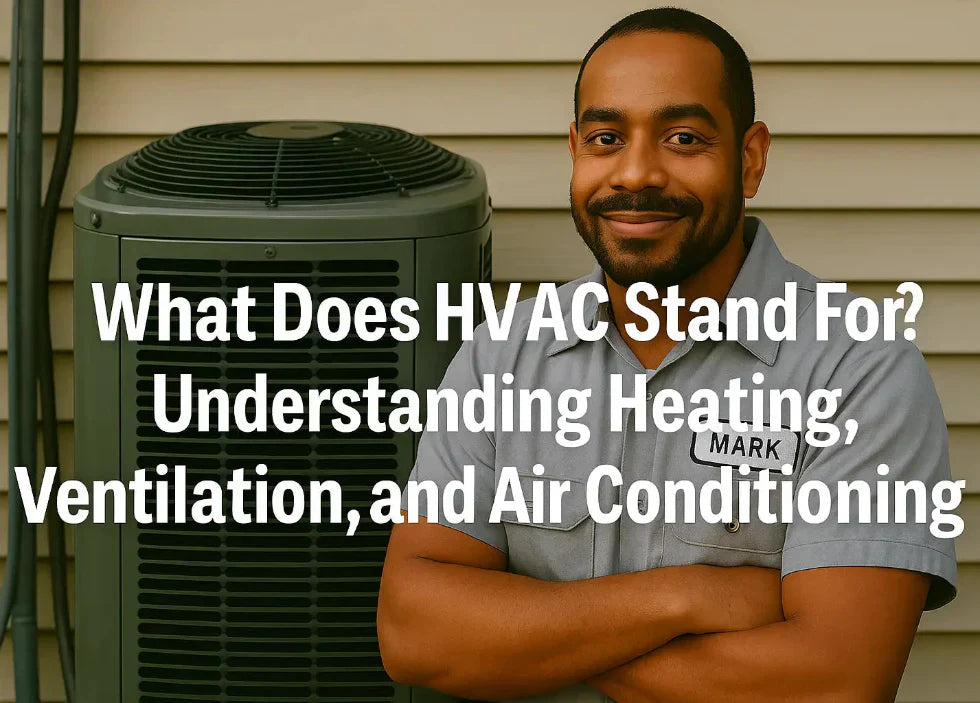🏠 HVAC Stands for Heating, Ventilation, and Air Conditioning
If you’re new to this world, you might wonder, what does HVAC stand for? Simply put, HVAC stands for Heating, Ventilation, and Air Conditioning. It’s an all-in-one term that describes the systems keeping your home warm in the winter, cool in the summer, and filled with fresh, clean air all year long.
Every time someone mentions their HVAC system, they’re talking about that whole interconnected setup — the furnace or heat pump that heats your home, the ductwork that circulates the air, the condenser and evaporator that make up your AC unit, and the filters that keep dust and allergens under control. It’s all working together to keep your home comfortable and safe, no matter what’s going on outside.
And understanding these basics really matters because the way your system operates can affect your energy bills, your indoor air quality, and even your overall home value. Even small details — like knowing when to replace filters or recognizing the signs of a compressor issue — can make a big difference in your home’s comfort and efficiency.
If you’d like to dive even deeper into what HVAC really entails, this helpful What is HVAC? guide from Trane breaks down all the components and terminology you’ll encounter as a homeowner. It’s a great resource if you want to gain a deeper understanding of how your system works and what to look for when it’s time for maintenance, repair, or even a new installation.
When you know what HVAC stands for — and why each part of the system matters — you’re much better equipped to make informed decisions. That means choosing the right-sized unit for your home, making sure everything is installed properly, and keeping up with regular upkeep so that your system runs efficiently for years to come. Ultimately, it all adds up to a more comfortable home environment, lower energy bills, and fewer surprise repairs.
🌡️ HVAC: What Does It Mean for Your Home?
When we say “HVAC what does it mean,” we’re looking at the components that work together to make sure your home stays at a comfortable temperature all year long.
Here’s a breakdown:
✅ Heating — Furnaces or heat pumps warm your home.
✅ Ventilation — Ducts and fans circulate fresh, filtered air and help reduce humidity.
✅ Air Conditioning — The condenser and evaporator coil remove heat and moisture from the air inside.
Your system might look like a furnace in the basement or an outside condenser unit hooked up to a series of ducts — all part of that big HVAC family. According to Energy.gov’s Heating & Cooling basics, well-maintained HVAC systems save energy and money.
🍃 Why Ventilation is Just as Important as Heating and Cooling
When most people ask, what does HVAC mean, they often focus on heating and air conditioning. But don’t overlook ventilation — it’s the silent hero of a comfy home.
Your HVAC system’s ventilation is like its lungs, keeping your indoor air fresh by removing stale air and bringing in outside air. A good ventilation setup also manages humidity and prevents issues like mold growth or stale odors.
And with updated ventilation tech like energy recovery ventilators (ERVs) or heat recovery ventilators (HRVs), you can boost energy efficiency even further. The U.S. Environmental Protection Agency (EPA) discusses how proper ventilation improves indoor air quality and comfort.
⚡ What Does HVAC Stand For When It Comes to Energy Efficiency?
That acronym — HVAC stands for Heating, Ventilation, and Air Conditioning — also hints at your energy usage. Efficient HVAC systems can significantly cut utility bills and reduce your carbon footprint.
Here’s what you can do to improve energy efficiency:
🔧 Upgrade to a High-SEER AC Unit. The higher the SEER rating, the less electricity the unit consumes.
💡 Use Programmable Thermostats. This lets you fine-tune when the system is running.
🧰 Keep up with Routine Maintenance. Clean or replace filters, check refrigerant levels, and have a pro inspect the system regularly.
And if you’re looking for practical advice on choosing energy-efficient heating and cooling solutions, Energy Star’s home heating and cooling guidelines offer some easy wins.
🧰 The Importance of HVAC Maintenance
When folks ask me, “what does HVAC stand for,” I often follow up by stressing the importance of HVAC maintenance.
Your HVAC what does it mean is more than just hardware — it’s an ongoing commitment to proper care.
Here’s a simple routine that will help you keep everything in top shape:
🧽 Keep the condenser clear of debris. Trim grass, remove leaves, and make sure it’s not blocked.
🌬️ Replace air filters every 1–3 months. Clogged filters restrict airflow and increase energy consumption.
🧑🔧 Schedule seasonal tune-ups. A professional can catch small issues before they turn into big (and costly) problems.
🕰️ Listen for strange noises. Anything that clunks, squeals, or buzzes is a sign that your system might need attention.
And remember — a properly tuned system also enhances indoor air quality. According to the Centers for Disease Control and Prevention (CDC), regular maintenance of HVAC systems can improve comfort and prevent indoor pollution.
🔌 Mark’s Plug & Play Recap
Your home’s comfort truly depends on one hardworking acronym: HVAC — Heating, Ventilation, and Air Conditioning. Knowing what HVAC stands for is just the beginning; caring for it properly will reward you with years of cool summers, warm winters, and clean, breathable air.
And when you’re ready to explore new units or upgrades, check out my Complete Guide to a 2 ½ Ton Air Conditioner to help you pick the perfect fit for your space.
Stay proactive, stay comfortable, and if you have questions — you know where to find me. Thanks for reading! ✌️
-Mark 🔌







